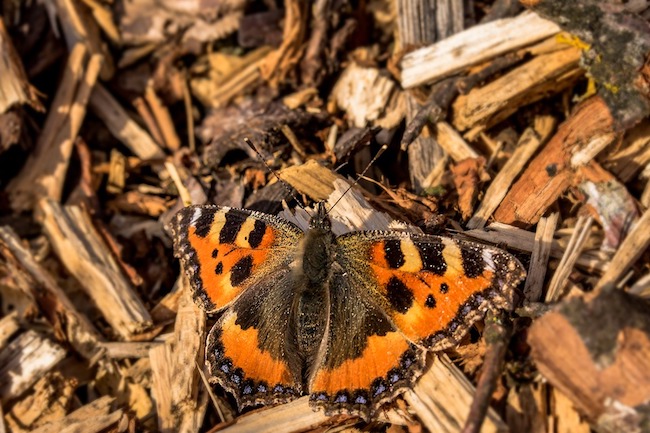
I may never be able to say enough good things about mulch. It protects soil from erosion, adds nutrients, and so much more. Despite the growing interest in no-till gardening and permaculture, some people are still hesitant to use wood chips as mulch in their garden. They may not break down as quickly as other mulches but wood chips still have many benefits.
Where to Find Wood Chips
One of the best things about wood chips is that you can often find them for free and you can be fairly certain that they’re free of chemicals, trash, and weed seeds. To locate free wood chips ask your town or city for the company that trims roadsides and power-lines. These companies are often looking for ways to get rid of the excess of wood chips they create. Sometimes if you live near where they’re cutting they’ll even deliver it to your yard for free. Alternatively, check with local landscaping companies and arborists as well as garden supply and feed stores. While colored bark mulches are usually pricey they may offer plain wood chips for a decent price.
What About “Nitrogen Tie-Up”
For anyone unfamiliar, “nitrogen tie-up” is when the nitrogen in your soil is being used by microorganisms to break down carbon material (like wood chips) making it unavailable to plants for a time. However this doesn’t make wood chips bad, remember plants need carbon too! Some farmers also see other benefits of “nitrogen tie-up” like the fact that the nitrogen doesn’t leach out of the soil or too far down for plants to reach. If it seems like your wood chips are taking too long to break down or you’re seeing signs of nitrogen deficiency you can add amendments to boost your nitrogen levels and help your wood chips break down. Grass clippings, seaweed, chicken manure, and soy meal are all great options depending on where you live and what you have available.
Moisture Control & Weed Suppression
Wood chips do an excellent job at helping to keep your soils evenly moist. Many people know that they help keep your soil from drying out which is very important in dry climates or for those without access to irrigation. However, fewer people are aware that wood chips can help with soggy soils too. Wood chips help absorb excess moisture and are a great way to add organic matter to heavy clay soils. Also worth noting is how a thick layer of wood chips can help suppress weeds and unlike black plastic, it will fully break down leaving you without clean up and a smaller environmental impact.
Wood Chips are Prime Habitat
Two important features in organic gardens are fungus and beneficial insects. Wood chips are an excellent way to encourage both of these. Many of the types of fungus in your garden that help break down organic material into usable nutrients for plants will thrive with the addition of wood chips. Some people, like awesome folks of Edible Acres, actually grow edible mushrooms like wine caps on the wood chips in their garden! Several insects like earthworms and predatory beetles also enjoy habitat created by wood chips. Earthworms like the moist soil and will feed on the wood chips as they break down and predatory beetles will use them as shelter as they feed on the harmful pests that attack garden plants.
If you’re looking to add mulch to your garden this year consider wood chips. In most areas of the east coast, they’re readily available and can help you create healthier soils and a more productive garden.
